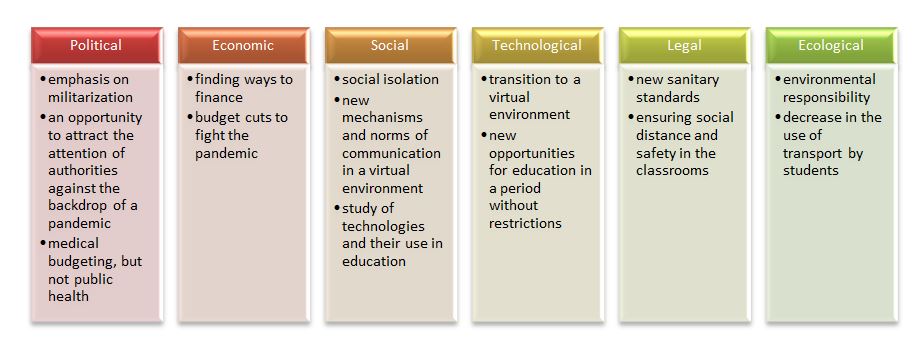Public health is a crucial aspect of sustainability for the entire society on a national scale. However, several aspects hinder the coherent and entirely satisfactory cooperation of public health authorities and authorities. However, the coronavirus pandemic has brought the US government to the issue of social and environmental responsibility, which has received little attention and budget funding in favor of militarization (Hartung, 2020). In fact, only the global crisis in the form of a pandemic forced the government to contact public health officials. This opportunity should finally draw the attention of state authorities to the main problems within the country that militarization and the military sector cannot solve: they require direct intervention and funding.
The interaction between public health and government is dictated by external factors that require a reaction or response. In this regard, it is proposed to use the PESTLE mechanism to assess these factors in the context of After-Hours Academy, a social startup aimed at closing gaps in academic learning and providing technical resources for education to low-income families. In the context of the pandemic, which has affected almost every aspect of PESTLE analysis, the influence of external factors on this ratio has multiplied. Although government agencies could pay attention and provide financial opportunities to promote public health, most funding went to medicine.
Political factors include a focus on militarization, and spending on the military sector far exceeds spending on other critical sectors of the economy. Public health, however, can address many of the root causes of a country’s internal security problems by providing people with education, employment, and conflict resolution (Hartung, 2020). Medicine is more focused on solving the symptoms of these problems and has a different status, especially in a pandemic. As a result, even though the United States spends more on medicine than other countries globally, public health authorities do not receive adequate funding to solve all pressing problems.
Social factors have become closely intertwined with technological ones since isolation and forced restrictions have led to the widespread need to use various specific software for remote interaction. Appropriate trends are also emerging in education, both a forced measure and a new reality. Students and teachers must use technology to provide a highly effective educational process, but the lack of preparation of the relevant authorities has become an obstacle at this stage. Besides financial support, public authorities can offer a management solution to consult and create adequate collaboration opportunities in a virtual environment.
Environmental factors have only a distant and indirect influence on this startup. It should be taken into account that with distance learning, many children and their parents do not spend time on the road and do not use cars and public transport, reducing greenhouse gas emissions into the air. Legal factors include mechanisms for organizing interaction with government agencies for subsidies, but at the same time require compliance with all existing and new laws, including sanitary norms of social distance and restrictions. Finally, economic factors are related to obtaining funding or volunteering services as part of the startup’s activities. These factors directly collide with the problem described above.
To overcome these barriers to interaction between the US government and public health, there are not only mechanisms for reallocating the budget from the military sector to those in particular need. In addition, the startup should consider regional offices of the US Public Health Service for grants in up-and-coming areas of social business. In addition, this startup is at the junction of organizations that have emerged under the influence of pandemic restrictions and gaps in education. Advertising activities to publicize the operational functionality of a startup can attract the public’s attention and, accordingly, the authorities. The redistribution of the budget lies within the competence of the government and is a budget search mechanism, and it is crucial for a startup to find ways to influence and draw attention to the problem more than to look for ways to achieve this goal on the part of government agencies. Figure 1 shows the PESTLE analysis table.

Reference
Hartung, W. (2020). To Save Lives, Shift Pentagon Spending to Public Health. Forbes. Web.